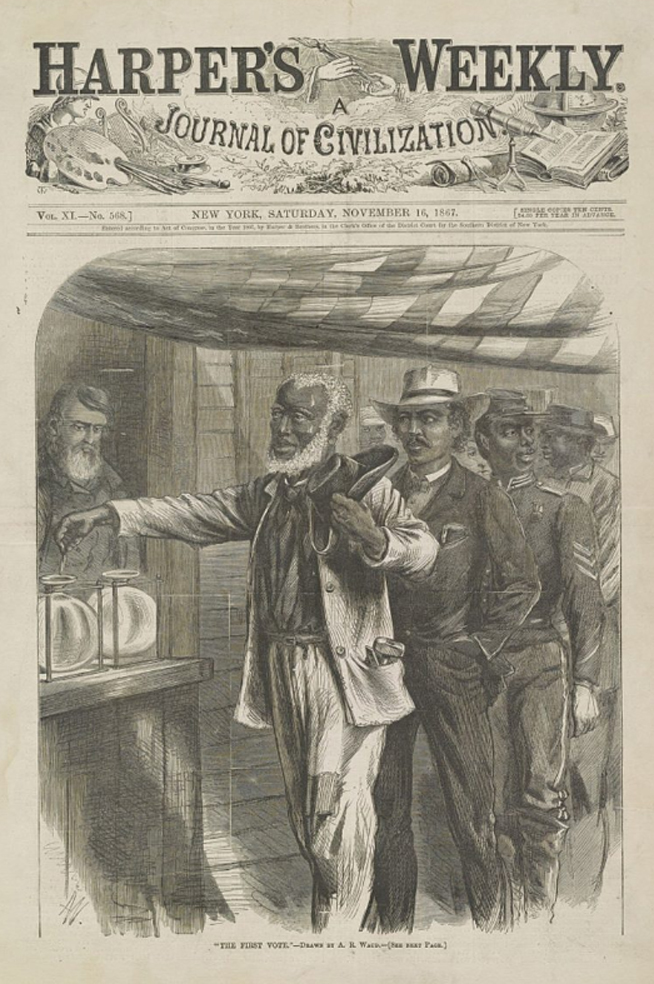Echoes of Reconstruction: Frustrate the “white-man-hating Yankee negro”
Emerging Civil War is pleased to welcome back Patrick Young, author of The Reconstruction Era blog
Supporters of white supremacy not only used violence from the Ku Klux Klan to influence the votes of African Americans in 1868. They also threatened to fire Blacks if they voted for Grant and his Republican allies. This threat was open, and it was designed to be seen by potential Black voters. The Charleston Mercury was one of the most widely read Southern newspapers, and it had helped bring on the Civil War. Right after the election it called for termination of Black workers.
In a post-election editorial “The Course of the South,” the newspaper made its objectives and tactics clear. In this article the Charleston Mercury says that it is the duty of white Southerners to refuse to employ African Americans who voted for the Republicans. The editorial appeared in the most prominent position in the newspaper on November 5, 1868.

In the Census of 1870, there were 290,000 white residents of South Carolina and 416,000 Blacks. It was clear that if elections were not interfered with, the Republicans would win.
The election of 1868 was the first election in which African Americans had a substantial role as voters. In the election, which saw violence against Blacks rise to a new level, racial fears of former Confederates were featured prominently by the Southern Democratic Party. The great Democratic Ratification meeting in New Orleans in August was one of many state or city gatherings organized by local Democrats to ratify Horatio Seymour as the party’s nominee. The New Orleans mass meeting introduced a new song to the world: “Raise High the White Man’s Banner.”
“Then comrade join the column
March onward to the fight
Beneath the white man’s banner
The laurel and the white
…To vindicate our Fathers’ choice-
“A white man’s government.””
In the November 5, 1868 editorial in the Charleston Mercury, the editors began by saying that white and Black can exist with “friendliness” side by side in the South. The Radicals of the North and the “white-man-hating Yankee negro” were never satisfied with the South’s carefully organized racial hierarchy, according to the Mercury.
The Republicans hoped to win the election by exciting the “lusts” of the “negro” for race mixing. According to the Mercury:
“…Their chief instrumentality, is in the organization of the negroes..,by which the passions and and lusts of the negroes are excited…”
The Mercury said it was “the duty” of whites to deny the basic freedoms of a democracy to African Americans. Here is how the authors put it:
“It is clearly not only the right, but the duty of the white man, to counteract as far as possible, these appeals to interest, by which the negro stands arrayed against him.”
The editors raised the spirit of conspiracy with “secret leagues” of Blacks conspiring with Northern Republicans to place the “negro” over the whites. A white man can not break up the “secret leagues,” said the Mercury, but there are ways the white race can win:
“He cannot prevent the secret leagues He cannot prevent the hate and lust they inspire…but he can appeal to the “Interest” of the negro in another way…He can refuse to employ him. He can say to him, since you think it proper to join in a league against me, and to take my property, -go to those whom you are associated in your robber schemes, for employment…You are an enemy.”
In 1868, the forces of white supremacy had used assassinations, deadly mob violence, arbitrary arrest of Blacks by the police, and interference with Blacks registering to vote. Now the Charleston Mercury said that white men had the duty to deny employment to Black voters. Since most employers were white, this would deprive most Black workers of their livelihood. In the same issue, the Mercury said that:
“On the question of the rule of races, the white race of the South, will constitute but one army.”
In South Carolina, where Blacks made up a majority of the population, Republican Ulysses S. Grant won by 8,000 votes. The Mercury and its paramilitary allies did not swing the election, and the paper soon closed.
White supremacists reorganized themselves into the South Carolina Red Shirts in the 1870s and were able to secure a white government under Confederate Gen. Wade Hampton in the 1876 election. After that election, Blacks would never again make their voices heard in South Carolina politics until the 1950s.
As Patrick’s article documents, white Democrats were totally open about the tactics they would use – subtle and not so subtle intimidation as well as raw violence – to prevent Blacks from voting and exercising new found freedoms such as seeking employment, buying land, and building wealth. Their 1868 slogan of “it’s a white man’s government, let the white man rule” made clear their intent to overturn the results of the Civil War and presaged almost one hundred years of relegating Black Americans to second-class citizenship.
Very good points Jeffrey.
Elizabeth R. Varon, a biographer of Longstreet, said, “Demonizing Longstreet was an essential element … as he was the most prominent former Confederate to join the Republican ranks and was setting a potentially dangerous example.”
Longstreet was an early advocate of former-Confederates recognizing that Blacks had the right to vote, which made him even more hated.
John Mosby was another former-Confederate who recognized the right of Blacks to vote. Avoiding criticizing Lee kept him from being assailed as much as Longstreet was. I read recently that Pickett was another “Scalawag”, as southerners who accepted the rights of Black to vote were called.
Yes Mosby accepted some advent of civil rights.
I have no idea why my tag is exuberant…etc. Vincent Tsao
“White-Man-Hating Yankee Negro.” Now that would be a great name for a band. Remember Bad Brains, the great black punk/ reggae band out of Washington, DC? Like them. Hard. White-Man-Hating Yankee Negro.